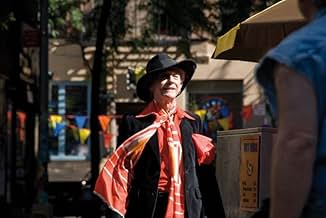The later years of Quentin Crisp's life in New York City.The later years of Quentin Crisp's life in New York City.The later years of Quentin Crisp's life in New York City.
- Nominated for 3 BAFTA Awards
- 5 wins & 8 nominations total
- Young Man
- (as Benjamin Eakley)
- DJ
- (as Craig 'muMs' Grant)
- Director
- Writer
- All cast & crew
- Production, box office & more at IMDbPro
Featured reviews
John Hurt brings a brilliant luster to his role as the strange but lovely elderly Crisp who sits before audiences and says what comes to his mind. He is befriended by Christopher Street editor Phillip Steel (Dennis O'Hare) who gives him work as a movie critic, noticed by promoter Connie Clausen (Swoosie Kurtz) who schedules him heavily in nightclubs as an act, shy painter Patrick Angus (Jonathan Tucker) whom he champions among galleries, and kooky performance artist Penny Arcade (Cynthia Nixon). At the height of his popularity he makes a comments about AIDS being a 'fad', something that unites gays with a disease that Crisp claims is just what the straight public wants, and his popularity among his audience wanes. He discovers Angus is stricken with the disease and mourns his too soon death, and is sheltered by Steel as he grows into a fragile very elderly 91 year old. Throughout the film Hurt glows as the strange but somehow lovable Crisp, showing us all a side of a man who has been too often dismissed as a weird one. This is a very tender film, complemented by a first class cast, and one that deserves very wide attention.
Grady Harp
As a result, more or less the only 'plot event' of the film is the arrival of AIDS in New York, with even that seen largely through the effects on Crisp's career of a single dismissive quip (his reasoned attitude is that making too much of AIDS will only bolster public perception of homosexuals as disease-ridden outcasts, but this doesn't go down well among his target audience). Otherwise, "An Englishman in New York" consists largely of bons mots; little snippets of Crisp performing and delivering his famous lines, whether to an audience of one or to a small studio gathering.
That said, given the limitations of its material the film manages to pull off the difficult trick of its predecessor, presenting its deliberately flamboyant, over-the-top protagonist as a sympathetic human being whose pose we not only condone but find ourselves applauding. I generally shy away from 'gay issues', but find myself feeling here for the people he meets and the prejudice he encounters, both from them and on their behalf. In some ways, it is as hard to be a determinedly effeminate homosexual among the butch 'clones' of an out-of-the-closet New York as among the disapproving middle classes of pre-war England.
John Hurt does an excellent task in portraying the physical aging of the character, and of course it is a great bonus to have the same actor appearing in both films with a genuine generational time-lapse between them. It is just a truism that -- despite Quentin Crisp's much-repeated prediction that every year "things are going to get worse" -- happiness, as the proverb has it, simply doesn't make for such an enthralling story as do troubled times; and this is essentially a depiction of a man who has finally come to terms with the world, and it with him. As such it is well-meaning and pretty well executed, but not a particularly unmissable experience.
And inevitably it is less touching and less striking than its predecessor.
Did you know
- TriviaSir John Hurt also played this character in the television movie The Naked Civil Servant (1975). Quentin Crisp said of Sir John Hurt, that he was his representative here on Earth.
- Quotes
Quentin Crisp: Persistence is your greatest weapon. It is in the nature of barriers that they fall. Do not seek to become like your opponents. You have the burden and the great joy of being outsiders. Every day you live as a kind of triumph. This you should cling onto. You should make no effort to try and join society. Stay right where you are. Give your name and serial number and wait for society to form itself around you. Because it will most certainly will. Neither look forward where there is doubt nor backward where this is regret. Look inward and ask not if there is anything outside that you want but whether there is anything inside that you have not yet unpacked.
- ConnectionsFollows L'homme que je suis (1975)
- How long is An Englishman in New York?Powered by Alexa
















